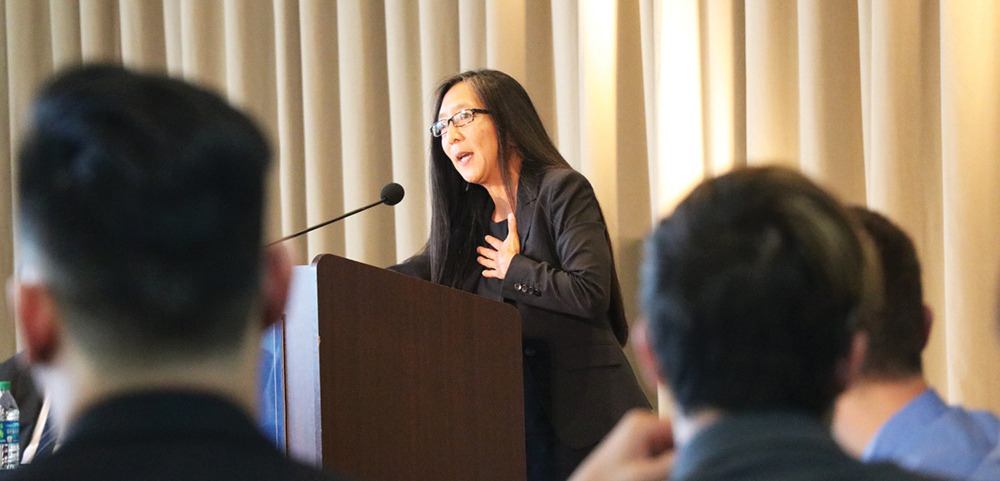
Award recipients advocated for better health care and support to transgender and gender non-conforming students and reflected on their own identities as part of the LGBTQ community at Georgetown University’s 10th annual Lavender Graduation, at which LGBTQ members of the Class of 2018 were honored April 26.
Hosted in the Healey Family Student Center by Georgetown’s LGBTQ Center, the graduation honored members and allies of the LGBTQ community for advocacy and work for promoting LGBTQ rights. Pamela Chen (LAW ’86), a federal district judge for the U.S. District Court for the Eastern District of New York, gave the keynote address, in which she reflected on her experiences in law school, when Georgetown was in the middle of a “gay rights battle.”
“In 1980, several gay student groups sued the university for equal access to campus resources. The case was winding its way through the courts, minutes away from the law school,” Chen said. “The year after I graduated, the District of Columbia Court of Appeals ruled that Georgetown gay student groups were entitled to equal access to university resources but that the university did not have to officially recognize them. We are certainly far from those days.”
Chen came out publicly in her early 30s after she had already entered her professional career and was on track to become a judge. Chen said although she was labeled as a “lesbian role model” for so many LGBTQ youth, she still found herself navigating her own identity.
“The confirmation process that I went through to become a judge was the first time I ever had to think about my separate identities – Asian-American, female, gay – in a holistic way,” Chen said. “I had to figure out what it all meant. As an Asian-American, I’ve always understood that one’s identity is defined both internally and externally. For me, my identity as an Asian-American was for a long time defined externally – by the world around me and how others perceived me.”
Chen said her identity as a gay woman has had many different implications than her identity as an Asian-American.
“All of my life, people made assumptions about me based on my being Asian, but being gay is something the outside world has never imposed on me, or identified me as, until I came out,” Chen said. “On a day-to-day basis, being gay is such a different identity than being Asian. I’ve always been visibly Asian: I’ve never had to announce it or mention it. Being identified as gay, by contrast, requires an affirmative declaration. There’s a reason they call it coming out. You have to self-report; you have to self-identify.”
Zack Frial (SFS ’18), Luiggy Vidal (COL ’18), Grace Smith (COL ’18) and Laura Padilla Pérez (COL ’18) were the undergraduate award winners for their advocacy efforts on campus and beyond. Dean Samuel Aronson and professor Dana Luciano were also recognized for their commitment to the LGBTQ community. Award winners from the Georgetown University Law Center comprised Charlie Gilfoil (LAW ’18) and professor Judith Perez Cara, while Casey Bishop (MED ’18) represented the Georgetown University School of Medicine.
Frial, who was awarded the LGBTQ Leadership Beyond the Gates award, spoke to their experience coming out at Georgetown.
“For many of us, college is the first chance we have not only to come out, but to come in – as we reflect on who we want to be,” Frial said. “Despite my wanting to accept myself as a whole person, the world is still not ready to accept me. Georgetown is not ready to accept me. I turn the question on you now: Is this Georgetown who you want to be?”
Frial said their lack of faith in Georgetown’s administration stemmed from the lack of resources available to transgender and gender non-conforming students.
“We need health care, access to the mental health services, hormone therapy and gender-affirming surgeries,” Frial said. “We need administration and other students on campus in GU Pride, in GU Queer People of Color, in reproductive justice groups – to recognize this. In the name of cura personalis – care for the whole person – will Georgetown come in once more and make the next step to care for its transgender students?”
Chen said that Georgetown has, however, advanced greatly in its treatment of its LGBTQ students, attributing this progress in part to student activism and student advocacy groups.
In a final piece advice for the graduating members of the LGBTQ community, Chen encouraged them to be free and comfortable in their identities while venturing forward in the world.
“One should live as openly and proudly as you can – whenever and wherever,” Chen said. “Just as the fact as my presence on the bench as an openly gay judge helps brings down stereotypes and barriers, so too does your act of living your life authentically and openly.”




















